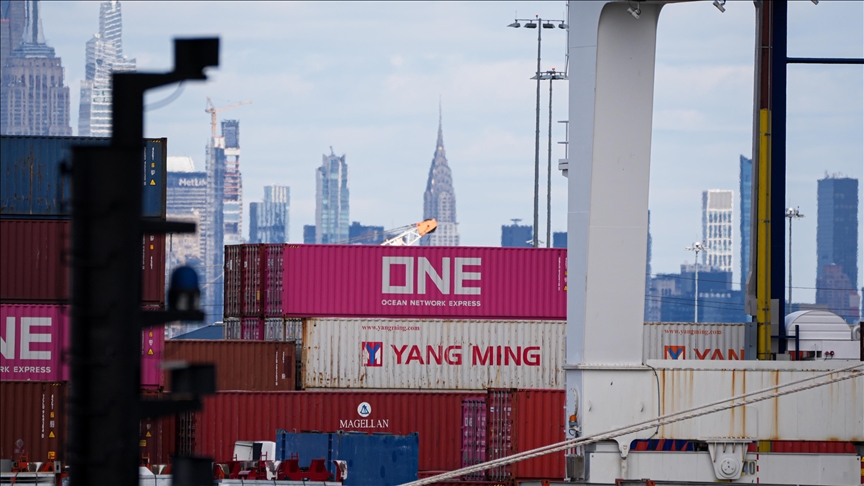Import cargo levels at US ports expected to fall sharply due to tariffs: Report
'Tariffs are taxes on US importers ultimately paid by consumers,' says NRF vice president
 A general view of the Port Container Terminal on April 08, 2025, in New Jersey, United States.
A general view of the Port Container Terminal on April 08, 2025, in New Jersey, United States.
ISTANBUL
The US National Retail Federation (NRF) reported Wednesday that import cargo at the country's major container ports is expected to drop significantly starting next month due to the comprehensive tariffs imposed on all trading partners.
NRF cited a statement on the Global Port Tracker report on global port tracking published in cooperation with Hackett Associates, which noted that following the tariffs announced earlier this year on China, Canada and Mexico, US President Donald Trump last week announced reciprocal tariffs of 10% - 50% on more than 180 countries.
Trump also announced additional tariffs against China after China's retaliatory response, and noted that the tariff rate increased to 104%, which is much higher than penalties announced in previous years are taken into account.
The statement noted that the cargo handled by the US ports covered by Global Port Tracker in February fell 7.5% compared to January, but increased 5.2% on an annual basis.
"It was the busiest February in three years even through the month is traditionally the slowest of the year because of Lunar New Year factory shutdowns in China," it said.
Although the ports have not yet reported data for March, NRF said it expects a year-on-year increase of 11.1% in March.
For April, NRF expects a 3.1% rise year-on-year, but May is expected to end 19 consecutive months of year-over-year growth, down 20.5% from the same time last year.
The forecast for June is the lowest volume since February 2023 and a 26.6% drop year-over-year. July is forecast to be down 27% year-over-year, and August off 26.8%.
“Retailers have been bringing merchandise into the country for months in attempts to mitigate against rising tariffs, but that opportunity has come to an end with the imposition of the ‘reciprocal’ tariffs,” according to NRF Vice President Jonathan Gold.
"Tariffs are taxes on US importers ultimately paid by consumers. They are creating anxiety and uncertainty for American businesses and families alike with the speed at which they are being implemented and stacked upon each other.
"At this point, retailers are expected to pull back and rely on built-up inventories, at least long enough to see what will happen next," he added.
Trump announced a 90-day reprieve to more than 75 nations from a Wednesday deadline in which they were expected to be hit with tariffs above his 10% baseline.
"I have authorized a 90 day PAUSE, and a substantially lowered Reciprocal Tariff during this period, of 10%, also effective immediately," he wrote Wednesday on Truth Social.
He went on to write that he was raising the tariff rate on China to 125%.
Anadolu Agency website contains only a portion of the news stories offered to subscribers in the AA News Broadcasting System (HAS), and in summarized form. Please contact us for subscription options.







